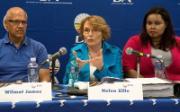
EVERY now and then, we are reminded that South African liberalism, like its counterparts elsewhere, has two faces. Right now, the Democratic Alliance (DA) is wrestling with which it should choose.
It was DA leader Helen Zille who angrily reminded us of this when she told those who accuse the DA of turning its back on liberal principles that there is more than one form of liberalism and that they had no right to decide that theirs was the only one. What she did not say is that her party is still deciding which liberalism it will choose.
Its decision to endorse racial redress but reject quotas leaves open key questions about what its policy really is. More important, while the battle for the soul of the DA has been portrayed as a contest between its "black caucus" and its mainly white establishment over employment equity, it is much broader — a contest between two liberalisms. It will take more than a resolution on redress to settle this question.
As this column has pointed out, the liberalism that dominated the DA before Zille took over strongly resembled what Canadian philosopher CB Macpherson called "possessive individualism". In this view, property owners owe nothing to society because whatever they have they acquired through their own efforts. The government’s job is to protect them from society, not to force them to contribute to it.
In South Africa, this liberalism also expresses a cultural prejudice. Philosopher Richard Turner said it insists that "western civilisation" is superior to all others. Whites (particularly those whose home language is English) already possess it — blacks need to be educated if they want it. This liberalism is more an expression of an English-speaking suburban sense of superiority than a philosophy of individual freedom.
It has deep roots in our society. Under apartheid, it supported a qualified franchise, which meant people could vote only if they acquired the property and culture which showed they were civilised. It kept a distance from black people so as not to offend white sensibilities. Predictably, it now rejects measures to redress racial inequality.
Not only do they burden owners of property, they dictate to the heirs of western civilisation who should work for and with them and who should teach them. Its supporters might pay lip service to redressing the discrimination in our past — only if it does not force property owners to give up anything.
But here, as elsewhere, there is also what Macpherson called "developmental" liberalism. It is concerned not with protecting property owners alone, but with balancing their rights with those of others, which means that owners must contribute to society in exchange for the recognition of their rights.
This liberalism is about developing the capacities of individuals. And so it insists that no culture is better than any other — and that, because no one has the right to claim that their opinions are better than anyone else’s, the view of the majority must be respected. Here, this liberalism expresses itself in respect for majority opinion, in avoiding cultural prejudices and in support for measures to ensure that past victims of discrimination can realise their potential.
It, too, has deep roots even if it was not often the majority view among liberals. It is represented by those liberals who insisted that everyone should be entitled to vote and who worked across racial lines to fight apartheid laws. They fought the forced removal of black people from their land in the 1950s and some engaged in passive resistance to oppose discrimination. Not surprisingly, this liberalism began to win black support. It also played an important role in promoting contact between white interests and the African National Congress (ANC), which led to the negotiated settlement ending apartheid.
As the DA has sought to break out of the suburbs, it has had to consider whether "possessive individualism" makes sense to most South Africans. The issue it faces is not whether it is a black or white party or whether it moves closer to or further from the ANC. It is whether it will abandon tribal liberalism for a brand that speaks to everyone.
The last time these battles were fought was in the Liberal Party of the 1950s. The developmental liberals won the battle for votes for all and a more active stance against discrimination. But their victory was partial and temporary — the "possessive individualists" joined the Progressive Party, a DA forerunner, which made liberalism more acceptable to people in the suburbs, but cut it off from the townships.
This time, the argument is not about how to fight apartheid but the values that should govern a democracy. But the choice remains the same — a liberalism that feeds the sense of superiority of the few or one that offers an alternative to the many. Because so much is at stake, the battle between the two liberalisms will occupy the DA for a while yet.
By Steven Friedman
(Left to right) Democratic Alliance federal chairman Wilmot James, leader Helen Zille and parliamentary leader Lindiwe Mazibuko address a media briefing on Sunday on the outcome of the party's federal council on policy. Picture: TREVOR SAMSON
Friedman is director of the Centre for the Study of Democracy.
Source: BusinessDay
